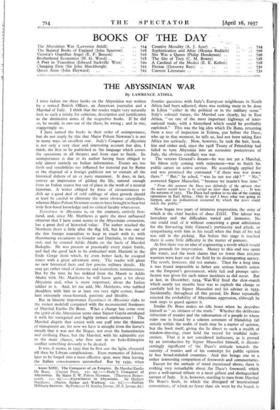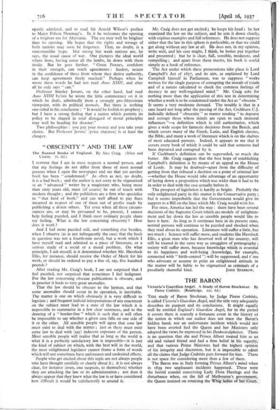THE ABYSSINIAN WAR
BOOKS OF THE DAY
By LAWRENCE ATHILL
I HAVE before me three books on the Abyssinian war written by a retired British Officer, an American journalist and a
Marshal of Italy. I think that the reader might very naturally look to such a trinity for criticism, description and justification as the distinctive notes of the respective books. If he did so, he would, in two out of the three, be wrong ; and in one, staggeringly so.
I have named the books in their order of unimportance, but do not imply by this that Major Poison Newman's is not in many ways an excellent one. Italy's Conquest of Abyssinia is not only a very clear and interesting account but also, I think, the first to be published in 'his language which covers the operations in all theatres and from start to finish. Its unimportance is due to its author having been obliged to rely almost entirely on Italian information. Events are too fresh and sensibilities too inflamed for material put by Rome at the disposal of a foreign publicist not to contain all. the historical defects of an ex parte statement. It does, in fact, convey an impression of gilding the lily, natural enough from an Italian source but out of place in the work of a neutral historian. A writer obliged by force of circumstances to dish up a good deal of cold cabbage of alien growth should at least be careful to eliminate the more obvious caterpillars, whereas Major Poison Newman seems to have brought to bear but little first-hand knowledge and no critical faculty whatsoever.
Eyewitness in Abyssinia is, on the contrary, entirely first- hand, and, since Mr. Matthews is quite the most unbiassed observer that I have come across in the Abyssinian connexion, has a great deal of historical value. The author reached the Northern front a little after the flag fell, but he was one of the few foreign journalists to keep in touch with it, with illuminating excursions to Gondar and Danhalia, to the bitter end, and he entered Addis Ababa on the heels of Marshal Badoglio. He was present at practically every major battle, and had the good luck to be ambushed with Mariotti in the Ende Gorge from which, by even better luck, he escaped intact with a great adventure story. The reader will glean no new historical facts and few precise military details. He may get rather tired of domestic and journalistic reminiscences. But by the time he has trekked from the Mareb to Addis Ababa with Mr. Matthews he will know quite a lot about Abyssinia and, what is more important, about the Italian soldier in it. And, let me add, Mr. Matthews, who rubbed shoulders with him in at least one very tight corner, found him extremely stout-hearted, patriotic and likeable.
But in historic importance Eyewitness in Abyssinia sinks to the veriest molehill compared with the monumental frankness of Marshal Emilio De Bono. What a change has come over the spirit of the Abyssinian scene since Signor Gayda enveloped it with his variegated and highly irritant smokescreen ! The Marshal dispels that screen with one puff into the thinnest of transparent air, for now we have it straight from the horse's mouth that it was not the Negus, not even the humanitarian and civilising Duce, but the Marshal, with his admirable eye to the main chance, who first saw in an Italo-Ethiopian conflict something devoutly to be desired.
It was, it seems, in 1932 that he first saw the light, obscured till then by Libyan complications. Even memories of Adowa, later to be forged into a most effective spur, were then leaving the Italian consciousness unrowelled. But by 1932, when
Anno XIII i. The Conquest of an Empire. By Marshal Emilio De Bono. (Cresset Press. us. 6d.)—Italy's Conquest of Abyssinia. By Major E. W. Poison Newman. (Thornton Butter- worth. us. 6d.)—Eyewitness in Abyssinia. By Herbert Matthews. (Martin Seeker and Warburg. us. 6d.)—Italian Military Secrets. By Professor H. Stanley Jevons. (H. S. Jevons. 6d.)
frontier questions with Italy's European neighbours in North Africa had been adjusted, there was nothing more to be done in Libya " either in the political or in the military sense." Italy's colonial future, the Marshal saw clearly, lay in East Africa, " on one of the most important highways of inter- national trade, with a hinterland which could be profitably exploited." This was the big idea which De Bono, returning from a tour of inspection in Eritrea, put before the Duce, who up to that moment, he tells us, had not been taking East
Africa too seriously. Now, however, he took the bait, hook, line and sinker and, since the 1928 Treaty of Friendship had failed to turn Abyssinia into an economic protectorate of Italy, the obvious corollary was war.
The veteran General's dream—he was not yet a Marshal, his baton only coming with retirement—was to finish his public career on active service. He accordingly applied for and was promised the command " if there was war down there." " But," he asked, " was he not too old ? " " No," answered Signor Mussolini, " because we mustn't lose time."
" From this moment the Duce was definitely of the opinion that the matter would have to be settled no later than 5936. . . . It was the autumn of 1933. The Duce had spoken to no one of the coming operations in East Africa. Only he and I knew what was going to happen, and no indiscretion occurred by which the news could reach the public."
Now began two years of intensive preparation, the story of which is the chief burden of Anna XIIII. The labour was herculean and the difficulties varied and immense. No one could read of it without conceiving a great admiration for the fire-eating little General's pertinacity and pluck, or sympathising with him in his recall when the fruit of his toil was still in the picking. But before this stage is reached there is some little difficulty in the matter of pretexts.
At first there was an idea of engineering a revolt which would give grounds for intervention. Money to this end was spent like water, and the book claims that no fewer than 200,000 warriors were kept out of the field by its disintegrating agency. The revolt, however, did not mature. Then for a long time it was found impossible to father any serious hostile action on the Emperor's government, while full and prompt satis- faction was given for such minor incidents as did occur. But
at last, in December, 1934, -Wal-Wal fired the slow-match which nearly ten months later was to explode the charge so carefully laid by Signor Mussolini and his adviser in 1933. Incidentally, throughout all this period, De Bono repeatedly rejected the probability of Abyssinian aggression, although he took steps to guard against it.
Emilio De Bono makes no idle boast when he describes himself as " an idolator of the truth." Whether the deliberate infraction of treaties and the subornation of a people to whose ruler one is bound by a solemn covenant of friendship fall strictly within the realm of truth may be a matter of opinion, but the book itself, giving the lie direct to such a wealth of window-dressing, must hold the record for truthful indis- cretion. That it is not considered indiscreet, as is proved by an introduction by Signor Mussolini himself, is discon- certingly significant of the Duce's attitude towards the
sanctity treaties and of his contempt for public opinion in less broad-minded countries. And this brings one to a rather interesting comparison of forewords and commentaries. Except for the attitude of mind mentioned above, there is nothing very remarkable about the Duce's foreword, which pays a well-earned tribute to a most gallant and distinguished servant of Italy. It is, however, startling to turn from Marshal 'De Bono's book, in which the disrtgard of -international conventions, of which no fewer than six went by the board, is openly admitted, and to read Sir Arnold Wilson's preface to Major Poison Newman's. In it he welcomes the opening, of a brighter era for Abyssinia. The era may well be brighter than its opening. He hopes that the rights and wrongs of both nations may soon be forgotten. That, no doubt, is a statesmanlike hope. Not strong but weak nations are, he says, the usual cause of war. One pictures the ideal world where lions, having eaten all the lambs, lie down with them inside. But he goes further. " Great Powers, confident in their strength, can reach agreements : leaders, secure in the confidence of those from whom they derive authority, can keep agreements freely reached." Perhaps when he wrote these words he had not read Anno XIII!, and after all he only says " can."
Professor Stanley Jevons, on the other hand, had read Anno XIIII before he wrote the little commentary on it in which he deals, admittedly from a strongly pro-Abyssinian viewpoint, with its political avowals. But there is nothing one-sided in his conclusion : " It would be foolish to prophesy ; but I have a strong feeling that a nation which permits its policy to be shaped in total disregard of moral principles may well be heading for disaster."
Two philosophies : you pay your money and you take your choice. But Professor Jevons' (price sixpence) is at least the cheaper.























































 Previous page
Previous page